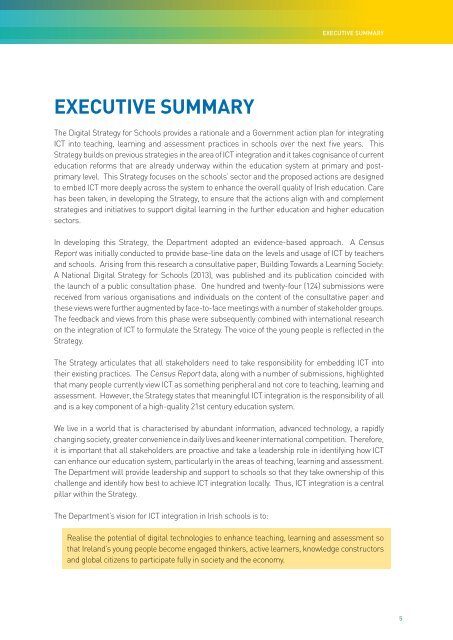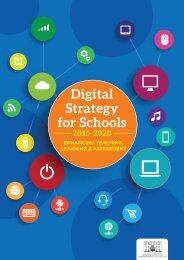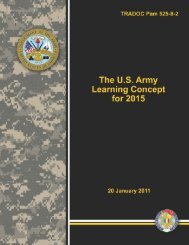Digital Strategy for Schools
TKmc0
TKmc0
You also want an ePaper? Increase the reach of your titles
YUMPU automatically turns print PDFs into web optimized ePapers that Google loves.
EXECUTIVE SUMMARY<br />
EXECUTIVE SUMMARY<br />
The <strong>Digital</strong> <strong>Strategy</strong> <strong>for</strong> <strong>Schools</strong> provides a rationale and a Government action plan <strong>for</strong> integrating<br />
ICT into teaching, learning and assessment practices in schools over the next five years. This<br />
<strong>Strategy</strong> builds on previous strategies in the area of ICT integration and it takes cognisance of current<br />
education re<strong>for</strong>ms that are already underway within the education system at primary and postprimary<br />
level. This <strong>Strategy</strong> focuses on the schools’ sector and the proposed actions are designed<br />
to embed ICT more deeply across the system to enhance the overall quality of Irish education. Care<br />
has been taken, in developing the <strong>Strategy</strong>, to ensure that the actions align with and complement<br />
strategies and initiatives to support digital learning in the further education and higher education<br />
sectors.<br />
In developing this <strong>Strategy</strong>, the Department adopted an evidence-based approach. A Census<br />
Report was initially conducted to provide base-line data on the levels and usage of ICT by teachers<br />
and schools. Arising from this research a consultative paper, Building Towards a Learning Society:<br />
A National <strong>Digital</strong> <strong>Strategy</strong> <strong>for</strong> <strong>Schools</strong> (2013), was published and its publication coincided with<br />
the launch of a public consultation phase. One hundred and twenty-four (124) submissions were<br />
received from various organisations and individuals on the content of the consultative paper and<br />
these views were further augmented by face-to-face meetings with a number of stakeholder groups.<br />
The feedback and views from this phase were subsequently combined with international research<br />
on the integration of ICT to <strong>for</strong>mulate the <strong>Strategy</strong>. The voice of the young people is reflected in the<br />
<strong>Strategy</strong>.<br />
The <strong>Strategy</strong> articulates that all stakeholders need to take responsibility <strong>for</strong> embedding ICT into<br />
their existing practices. The Census Report data, along with a number of submissions, highlighted<br />
that many people currently view ICT as something peripheral and not core to teaching, learning and<br />
assessment. However, the <strong>Strategy</strong> states that meaningful ICT integration is the responsibility of all<br />
and is a key component of a high-quality 21st century education system.<br />
We live in a world that is characterised by abundant in<strong>for</strong>mation, advanced technology, a rapidly<br />
changing society, greater convenience in daily lives and keener international competition. There<strong>for</strong>e,<br />
it is important that all stakeholders are proactive and take a leadership role in identifying how ICT<br />
can enhance our education system, particularly in the areas of teaching, learning and assessment.<br />
The Department will provide leadership and support to schools so that they take ownership of this<br />
challenge and identify how best to achieve ICT integration locally. Thus, ICT integration is a central<br />
pillar within the <strong>Strategy</strong>.<br />
The Department’s vision <strong>for</strong> ICT integration in Irish schools is to:<br />
Realise the potential of digital technologies to enhance teaching, learning and assessment so<br />
that Ireland’s young people become engaged thinkers, active learners, knowledge constructors<br />
and global citizens to participate fully in society and the economy.<br />
5




